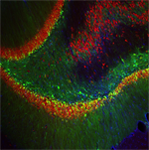Karl Deisseroth receives 2016 Breakthrough Prize in Life Sciences
November 8, 2015
The Breakthrough Prize and its founders Sergey Brin and Anne Wojcicki, Jack Ma and Cathy Zhang, Yuri and Julia Milner, and Mark Zuckerberg and Priscilla Chan, tonight announced the recipients of the 2016 Breakthrough Prize in Life Sciences, Fundamental Physics and Mathematics. A combined total of $21.9 million was awarded at the 3rd Annual Breakthrough Prize Awards Ceremony in Silicon Valley.
“By challenging conventional thinking and expanding knowledge over the long term, scientists can solve the biggest problems of our time,” said Mark Zuckerberg. “The Breakthrough Prize honors achievements in science and math so we can encourage more pioneering research and celebrate scientists as the heroes they truly are.”
The 2016 Breakthrough Prize in Life Sciences (five prizes, $3 million each) was presented to: Edward S. Boyden (MIT); Karl Deisseroth (Stanford University and Howard Hughes Medical Institute); John Hardy (University College London); Helen Hobbs (University of Texas Southwestern Medical Center and Howard Hughes Medical Institute); and Svante Pääbo (Max Planck Institute for Evolutionary Anthropology).



